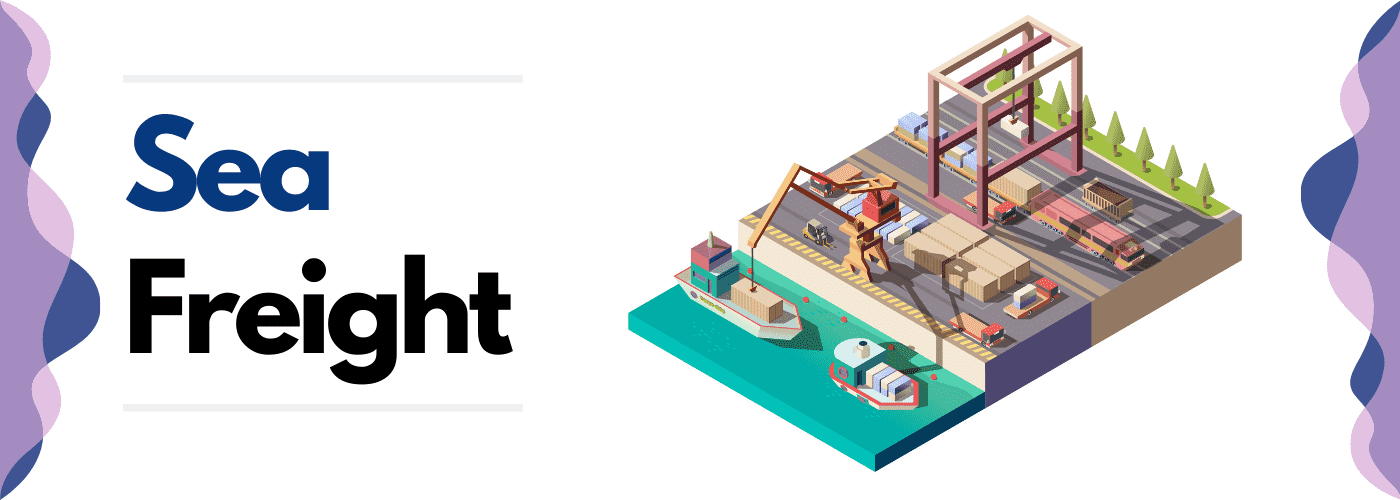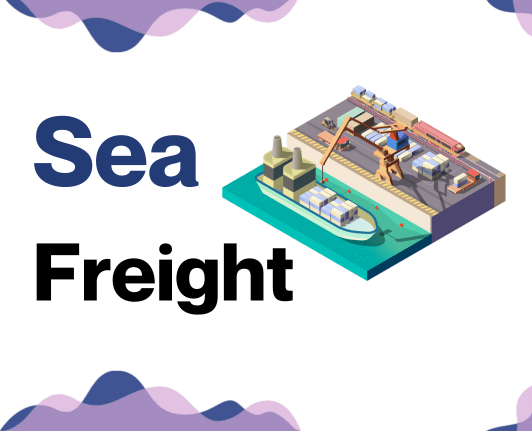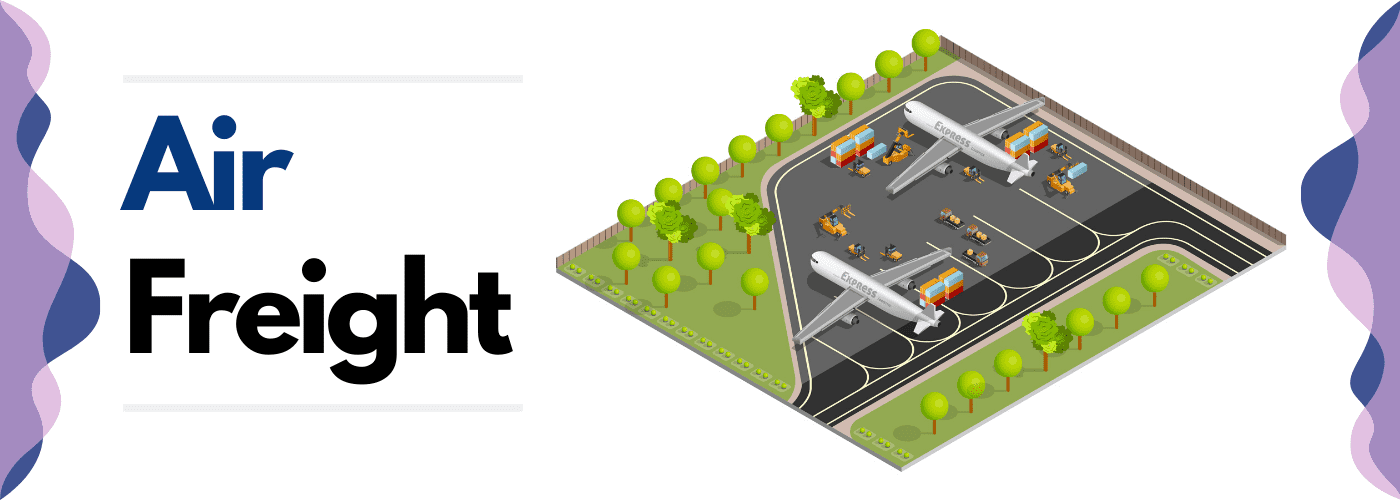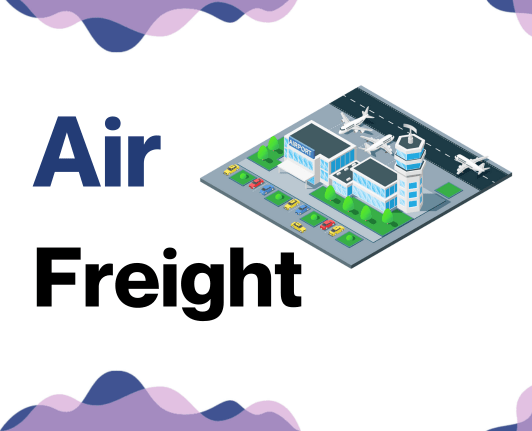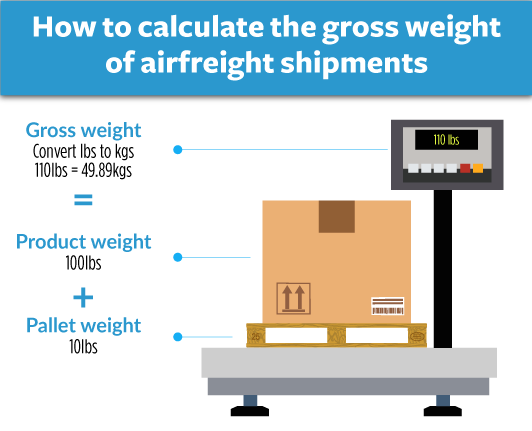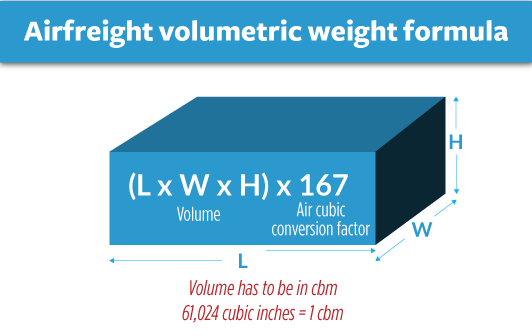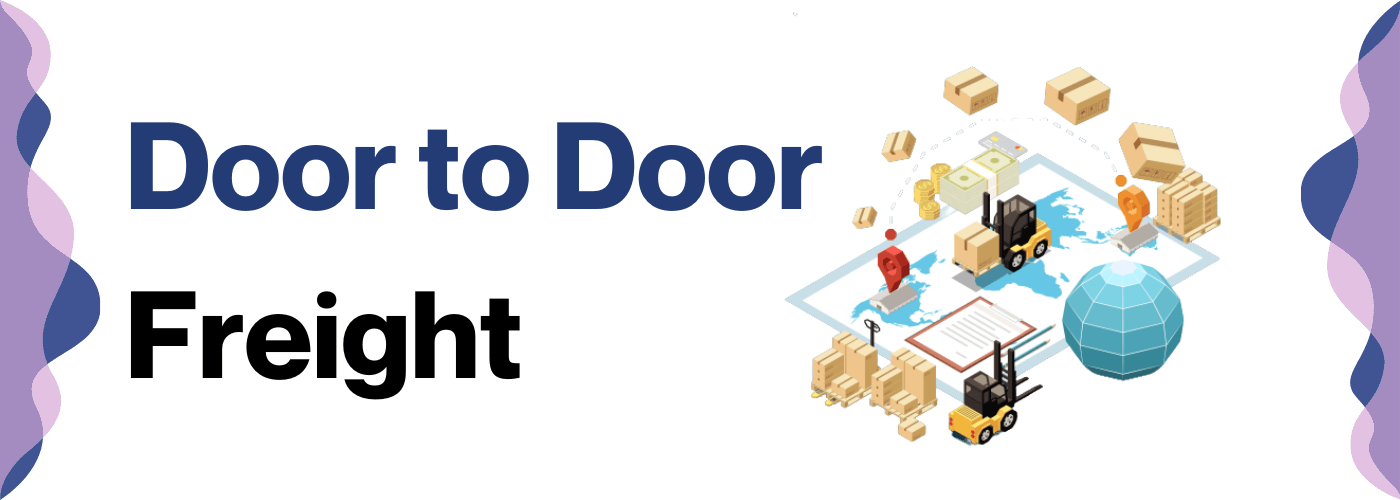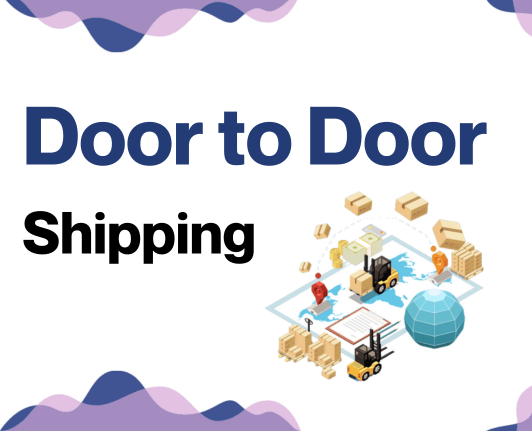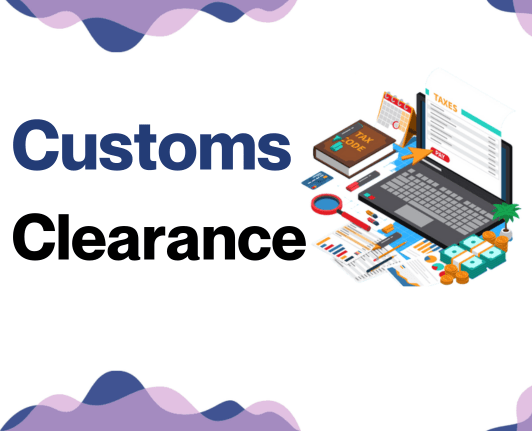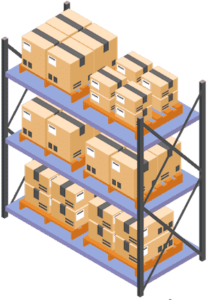Ever tried to send a double-decker bus from the UK to Bangladesh? It's not as simple as postage and packing, you're in need of a freight forwarder! With barriers like deciphering shipping rates, predicting transit times, and untangling complex customs regulations, it’s important you have a full understanding of the process. Brace yourselves as this comprehensive guide is about to unfold the ins and outs of freight transport.
We'll delve into different freight options: be it by air, sea, road, or rail, and demystify customs clearance procedures, duties, and taxes. You'll pick up helpful advice tailored for your business, whether large or small. If the process still feels overwhelming, let DocShipper handle it for you! Our specialty is turning these international shipping challenges into major wins for our client businesses.
Table of Contents
Which are the different modes of transportation between UK and Bangladesh?
Shipping from the UK to Bangladesh isn't a walk in the park - it's a bit like planning a world tour. With over a whopping 5,000 miles between them and countless borders to cross, road and rail routes get quite tricky. Picking the right mode of transport - like a meticulous tour planner - becomes essential. So, whether you're exporting textiles or electronics, is it by air or sea? Join us as we explore the pros and cons of these two prime contenders, helping you make the right ‘tour’ plan for your goods' journey.
How can DocShipper help?
Got a shipment moving from the UK to Bangladesh? Let DocShipper handle it! We are experts in coordinating every aspect, from transport planning to customs clearance. Let's turn the complex into simple. Reach out now for a free estimate in less than 24 hours, or call our consultants for any queries. All advice is free and friendly. Ready to take the leap?
DocShipper Tip: Ocean freight might be the best solution for you if:
- You're dealing with large quantities or oversized items. Sea freight offers a budget-friendly way to maximize space, a particularly useful option given the UK's extensive port network.
- Your shipment isn't on a tight schedule. Ocean transport typically takes longer than air or rail, but it offers reliability.
- Your supply chain involves key ports, allowing you to take advantage of a wide-reaching network of sea lanes.
Sea freight between UK and Bangladesh
Welcome to a journey that spans over 5,000 miles: ocean shipping from the UK to Bangladesh. This route highlights a powerful trade relationship, linking the bustling ports of London and Chattogram – key industrial epicenters in their respective countries. If you have high-volume goods in tow, sea freight is your trustworthy, albeit slow, co-pilot due to its cost-effectiveness.
For many businesses, this shipping route often feels like a difficult labyrinth, fraught with errors and setbacks. Unfamiliar customs regulations, overlooked shipping specifications, or simply the daunting depth of the entire process, are common roadblocks. But fear not! Just as every intricate web has its thread, there are practical strategies and know-hows to smooth the journey out. Through this section, we reveal these, transforming uncertainties into informed decisions. Better buckle up; no rollercoaster here, just a smooth sail fortifying your trade expedition.
Main shipping ports in UK
Port of Felixstowe
Location and Volume: Located on the southeastern coast of England, the Port of Felixstowe is the largest and busiest container port in the UK, with a shipping volume of over 4 million TEU annually.
Key Trading Partners and Strategic Importance: Its main trading partners are China, the United States, and various European countries. The port also plays a significant role in the UK's trade, as around 40% of the goods entering and leaving the country pass through it.
Context for Businesses: If you aim to access European markets while maintaining strong ties with the US and Asia, the Port of Felixstowe should be an integral part of your shipping strategy due to volume and versatility of shipping routes.
Port of London
Location and Volume: Situated along the River Thames, the Port of London is the second-largest in the United Kingdom, with over 50 million tonnes of cargo, including 20 million TEU, passing through it yearly.
Key Trading Partners and Strategic Importance: Major trading partners are the European Union, Asia, and the United States. The Port of London's strategic location and diverse cargo handling capabilities make it instrumental to UK's trade.
Context for Businesses: If you are planning to reach markets in Europe and Asia while utilizing diverse shipping options, the Port of London's ability to handle various types of cargo makes it an attractive option.
Port of Southampton
Location and Volume: Located on the southern coast of England, the Port of Southampton specializes in handling a high volume of automotive and cruise vessels while also having an annual cargo volume of over 1.9 million TEU.
Key Trading Partners and Strategic Importance: Its main trading partners are the Far East, North America, and Europe. The port is known for its fast ship turnaround times and advanced vehicle handling facilities.
Context for Businesses: If you're involved in the automotive industry or need quick turnaround times, the Port of Southampton could be crucial to your shipping strategies, considering its efficiency and infrastructure.
Port of Liverpool
Location and Volume: Located on the west coast of England, the Port of Liverpool handles about 500,000 TEU annually, servicing many different types of cargo.
Key Trading Partners and Strategic Importance: With main trading partners in the Americas and Europe, the port's extensive network and accessibility by canal networks make it a key hub for various types of goods.
Context for Businesses: If you're looking to ship a diverse range of goods or expand your logistics to the Americas, the Port of Liverpool's multi-faceted infrastructure and extensive network could be beneficial for your business.
Port of Immingham
Location and Volume: Situated on the east coast of England, the Port of Immingham is the UK's largest port by tonnage, handling more than 60 million tonnes of cargo annually.
Key Trading Partners and Strategic Importance: Predominantly trading with Western Europe, it is critical for the shipment of coal, oil, and other bulk commodities.
Context for Businesses: If your business involves the transport of bulk goods, especially to Western Europe, the Port of Immingham, with its specialization in handling these types of cargo, could be an excellent choice for your logistics.
Port of Grimsby
Location and Volume: Situated on England's east coast, the Port of Grimsby is a well-established port specializing in vehicles, fresh produce and bulk aggregates, and handles over half a million TEU annually.
Key Trading Partners and Strategic Importance: The port primarily trades with European and Scandinavian countries, cementing its importance in North Sea trade.
Context for Businesses: If your business deals with vehicle, fresh produce or bulk goods shipping, especially within Europe and Scandinavia, the Port of Grimsby, with its established infrastructure, could be a crucial asset to your shipping strategy.
Main shipping ports in Bangladesh
Chittagong Port
Location and Volume: Situated on the southeastern coast of Bangladesh, Chittagong Port is key to facilitating over 90% of Bangladesh's trade, handling around 3 million TEUs annually.
Key Trading Partners and Strategic Importance: The port primarily serves the key trading partners of Bangladesh including China, India, and the US. It is particularly important for Bangladesh's garment industry, facilitating the majority of its exports.
Context for Businesses: If broadening access to markets in Asia and the US forms part of your strategy, Chittagong can serve as the key link given its comprehensive handling of multiple types of cargo, including containers, break-bulk, and bulk.
Mongla Port
Location and Volume: Located in the southwestern part of Bangladesh, Mongla is the second largest port, handling approximately 1 million TEUs per year.
Key Trading Partners and Strategic Importance: Mongla port's major trading partners include China, India, Singapore, and Hong Kong, concentrating mainly on bulk cargo.
Context for Businesses: For businesses that rely heavily on bulk transportation, Mongla Port could be a beneficial addition to your freight forwarding strategy due to its emphasis on bulk cargo handling and proximity to major Asian markets.
Payra Port
Location and Volume: Found in the southern part of Bangladesh, Payra Port is a newer addition to Bangladesh's ports, projected to handle up to 1.5 million TEUs per year when it reaches full operational capacity.
Key Trading Partners and Strategic Importance: Currently serving a diverse range of countries due to its deep-water capabilities, Payra Port is strategically positioned to become an important hub in the Bay of Bengal.
Context for Businesses: Payra Port, with its potential for accommodating larger vessels and its strategic location for reaching Southeast and South Asian markets, may be an advantageous port to consider if your shipping needs align with its capabilities and future growth potential.
Should I choose FCL or LCL when shipping between UK and Bangladesh?
When shipping goods from the UK to Bangladesh via sea freight, making the correct choice between Full Container Load (FCL) and Less than Container Load (LCL), also known as consolidation, is vital. Your decision directly affects the cost, delivery time, and overall success of your shipment. This section is dedicated to presenting a clear comparison between FCL and LCL, helping you to understand the benefits and drawbacks of each. By the end, you'll be well-equipped to make an informed, strategic decision that aligns perfectly with your unique shipping requirements.
LCL: Less than Container Load
Definition:
LCL (Less than Container Load) shipping is a cost-effective method for smaller cargo sizes. It means that your goods are combined with others in a container, thus enabling you to pay only for the space you use.
When to Use:
Best for shipments that don't fill a whole container; typically less than 13-15 cubic meters (CBM). It also offers greater flexibility because freight departs at more regular intervals compared to FCL (Full Container Load).
Example:
Imagine a Bangladeshi clothing manufacturer wanting to send a small batch of clothes to a UK retailer. Instead of waiting to fill an entire container, he can use LCL shipment and get his goods moving quicker.
Cost Implications:
LCL freight can be economical as you only pay for the space used. However, bear in mind that multiple handling of goods can increase the risk of damage and add to the total transit time. Also, if your shipment grows close to a full container load, consider switching to FCL as it might be more cost-effective.
FCL: Full Container Load
Definition: FCL (Full Container Load) shipping is a type of ocean freight where you have exclusive use of a 20'ft or 40'ft container for your goods.
When to Use: FCL is highly recommended when your cargo fills up more than half the capacity of a 20'ft container, approximately equating to 13/14/15 CBM. The reasons are twofold; firstly, FCL is cheaper for high volume shipping as the fcl shipping quote is based on per container rather than per cubic meter. Secondly, safety is a critical benefit. The fcl container is sealed at the origin and remains untouched until it reaches its destination, minimizing potential risks during transit.
Example: Let's assume you're a UK-based furniture manufacturer exporting 16 CBM worth of tables and chairs to Bangladesh. Choosing FCL shipping would be cost-effective plus it ensures your fragile cargo remains sealed until it reaches your client.
Cost Implications: While FCL may have higher upfront costs than other options, it can be more economical long-term. It's worth noting not just the cost per CBM but also the peace of mind offered by having your goods in a single, secure container from origin to destination.
Unlock hassle-free shipping
Unsure if consolidation or a full container is the right choice for your UK to Bangladesh shipment? As your preferred freight forwarder, DocShipper is here to lighten the load. Let our ocean freight experts evaluate the size, type, and urgency of your shipment to help you make an informed decision. Opt for hassle-free shipping experience like no other. Reach out to us now for a free estimate!
How long does sea freight take between UK and Bangladesh?
Shipping goods from the UK to Bangladesh by sea freight generally takes around 22 to 30 days, depending on a variety of factors. The precise transit times revolve around elements such as the specific ports used, the weight, and nature of the goods being transported. For a detailed and personalized quote catered to specific needs, it is best to reach out to a freight forwarder like DocShipper.
Here is a representation of the average transit times between the main freight ports in both countries:
| UK Ports | Bangladesh Ports | Average Transit Time (Days) |
| London Gateway | Chittagong | 28 |
| Felixstowe | Mongla | 30 |
| Southampton | Paira | 30 |
| Liverpool | Chittagong | 28 |
*Please note that these are averages and actual times may vary.
How much does it cost to ship a container between UK and Bangladesh?
Determining the cost of shipping a container from the UK to Bangladesh may feel like walking in a maze. Ocean freight rates generally span a broad range per CBM. An exact figure is somewhat elusive, as it's subject to the Point of Loading, Point of Destination, the carrier chosen, the nature of the goods, and even monthly market fluctuations. These factors make it compelling to give a static shipping cost—because there isn't one! But don't worry, you aren't alone. Our shipping specialists are ready to guide you through this and offer the best rates, tailoring quotes on a case-by-case basis.
Special transportation services
Out of Gauge (OOG) Container
Definition: An OOG container is a special type of shipping container designed to carry out of gauge cargo or oversized goods that extend beyond the standard dimensions of a shipping container.
Suitable for: The unusual or larger-than-standard sizes of industrial machinery, construction equipment, or large-scale manufacturing parts.
Examples: This includes goods such as turbines, tractors, excavators, or windmill blades.
Why it might be the best choice for you: When your cargo extends beyond the dimensions of a standard container, out of gauge shipping can ensure safe and legal transport from the UK to Bangladesh.
Break Bulk
Definition: Break bulk is a method of transporting goods that are not containerized, and typically loaded individually or in groups onto a vessel.
Suitable for: Shipping large goods that aren't easily containerized due to their size, shape, or quantity.
Examples: This includes items like timber, cement, steel products, or construction equipment.
Why it might be the best choice for you: If your cargo doesn't fit into standardized containers and isn't suitable for OOG containers, break bulk shipping may be your preferred choice for its flexibility.
Dry Bulk
Definition: Dry bulk refers to the shipment of loose cargo load, such as grains, coal, or minerals, which are loaded directly into the vessel's cargo holds.
Suitable for: Shipment of large volumes of unpackaged commodities.
Examples: Grains, coal, and iron ore are prominent examples of dry bulk goods.
Why it might be the best choice for you: If your business trades in high volumes of loose commodities, shipping through dry bulk could provide the most cost-effective solution.
Roll-on/Roll-off (Ro-Ro)
Definition: The Roll-on/Roll-off method involves loading vehicles or equipment onto a ro-ro vessel which are rolled on at the origin and rolled off at the destination.
Suitable for: Movable machinery, vehicles, trailers, or equipment with wheels.
Examples: Cars, trucks, tractors, or trailers are generally shipped using this method.
Why it might be the best choice for you: If your business deals in wheeled cargo or heavy machinery, ro-ro shipping will provide a convenient and efficient solution.
Reefer Containers
Definition: Reefer containers are refrigerated shipping containers designed to maintain a constant temperature, ensuring the safe transport of perishable goods.
Suitable for: Fresh produce, frozen foods, pharmaceuticals or other items that require temperature control.
Examples: Seafood, dairy products, fruits, and vaccines are commonly transported in reefer containers.
Why it might be the best choice for you: If you're in the business of exporting temperature-sensitive goods, using a reefer container will ensure that your products retain their quality upon arrival in Bangladesh.
At DocShipper, we understand that each business and shipment is unique. No matter the type of cargo, our experts are here to provide customized shipping solutions between the UK and Bangladesh. Contact us today for a free shipping quote within less than 24h.
DocShipper Tip: Air freight might be the best solution for you if:
- You're facing tight deadlines or need rapid delivery. Air freight is your quickest option, which aligns well with the fast-paced business environment.
- Your shipment is relatively small, under 2 CBM. Air freight is ideal for these more compact loads.
- Your cargo's destination isn't easily reached via sea or rail. This makes air freight a viable option, especially given the extensive network of airports available.
Air freight between UK and Bangladesh
Breezing through international trade, air freight between the UK and Bangladesh is your match if speed and reliability take center stage. Picture this – you're shipping dazzling gemstones, where size doesn't do justice to value. Air freight shines here, handling small, high-value shipments effectively.
Now, let's shift gears. Many are on thin ice with air freight, primarily making rookie mistakes in cost estimation. Imagine you're baking a cake - you wouldn't just guesstimate ingredients, would you? Same rules apply here - overlooking the accurate weight formula and best practices can make your shipping bill dwarf your profits, and we don't want that. Stick around as we delve deeper into these sticky situations next.
Air Cargo vs Express Air Freight: How should I ship?
When it comes to flying your goods from the UK to Bangladesh, you're faced with a choice – ship via air cargo, squeezing your shipment in with others on a commercial airline, or opt for express air freight, rolling out the red carpet with a dedicated plane. Our guide will help you determine which option best suits your specific business needs. Buckle up, let's take the confusion out of air shipping!
Should I choose Air Cargo between UK and Bangladesh?
Air freight between the UK and Bangladesh can be cost-effective, reliable, yet slower due to fixed schedules. Carriers like British Airways and Biman Bangladesh Airlines are examples of prominent airlines offering this service. If your shipment is roughly 100/150 kg (220/330 lbs) or more, air cargo becomes particularly attractive. This might be the right choice for your business if a balance between budget and transit time is a priority. With air cargo, you have the potential to make significant savings while ensuring your goods arrive safely and securely.
Should I choose Express Air Freight between UK and Bangladesh?
Express air freight, a specialized service using cargo-only planes, can be a perfect choice for shipping between the UK and Bangladesh if your cargo is less than 1 CBM or weighs between 100 to 150 kg (220/330 lbs). Companies like FedEx, UPS, and DHL offer express services, ensuring speedy, safe, and reliable delivery. Opting for such services can often mean quicker customs clearance and less paperwork, making your shipping experience more efficient and easy. Consider express air freight for crucial, time-sensitive shipments.
Main international airports in UK
Heathrow Airport
Cargo Volume: The airport handles approximately 1.8 million tons of cargo annually, making it the busiest airport in the UK for cargo volume.
Key Trading Partners: Heathrow's main trade routes are with the USA, East Asia, and the EU, covering sectors such as technology, art, and precious metals.
Strategic Importance: Heathrow serves 180 destinations in 90 countries, strategically positioned to reach key global markets. Moreover, it hosts a diverse range of cargo airlines.
Notable Features: Heathrow's Cargo Tunnel provides quick, efficient access to its state-of-the-art cargo facilities. It also has dedicated facilities for handling live animals, hazardous materials, and temperature-sensitive products.
For Your Business: If you require a reliable hub with high capacity and options for shipping complex or critical cargoes, Heathrow might be an ideal choice. Whether you trade with booming Asian markets or the established USA and EU markets, its extensive routes and modern facilities ensure your shipments reach their destinations swiftly.
Manchester Airport
Cargo Volume: Manchester Airport handles over 110,000 tonnes of import and export freight and mail annually.
Key Trading Partners: Key cargo destinations include the USA, the Middle East and European countries such as Italy, Germany, and Belgium.
Strategic Importance: It's the biggest UK-owned airport operator and the third busiest airport in the country, providing easy access to the commercial heart of the UK.
Notable Features: The airport offers two cargo terminals, operated by dnata and WFS, managing freight including pharmaceuticals, electronics, textiles, and machinery.
For Your Business: If your business is in the North of the UK, Manchester Airport could be your go-to for its excellent road and rail connections, and for its expertise in handling a variety of specialized cargo.
Stansted Airport
Cargo Volume: Stansted handles around 200,000 tonnes annually.
Key Trading Partners: Important trading partners are East Asia, the Middle East, Americas and EU.
Strategic Importance: As a hub for FedEx and UPS, it plays a pivotal role in express cargo shipments and e-commerce.
Notable Features: Stansted has the largest FedEx and UPS bases outside the US.
For Your Business: If your business relies heavily on express or e-commerce shipments, choosing Stansted airport, with its robust infrastructure for fast and efficient cargo handling, could be an effective strategy.
East Midlands Airport
Cargo Volume: The airport handles more than 300,000 tonnes of flown cargo annually.
Key Trading Partners: Main trade partners are European and North American countries.
Strategic Importance: It’s the UK’s most important mail hub, hosting a large Royal Mail sorting office.
Notable Features: 24-hour operations make it suitable for time-sensitive shipments.
For Your Business: If your business involves frequent mail or overnight deliveries, East Midlands' round-the-clock capability, combined with its extensive air and road connectivity, can contribute to smoother, quicker operations.
Gatwick Airport
Cargo Volume: Gatwick processes over 100,000 tonnes of cargo annually.
Key Trading Partners: Key trading destinations are European countries, the Middle East and the USA.
Strategic Importance: Gatwick’s single runway is the world's busiest, offering efficient air cargo services to businesses.
Notable Features: The airport has a dedicated cargo terminal with comprehensive facilities.
For Your Business: If your business needs good access to Southern UK and European markets, Gatwick's dedicated cargo terminal and robust European connections could be particularly beneficial.
Main international airports in Bangladesh
Hazrat Shahjalal International Airport
Cargo Volume: With an annual cargo handling capacity exceeding 500,000 metric tons, Hazrat Shahjalal International Airport accounts for the majority of Bangladesh's air freight.
Key Trading Partners: Primary trading partners include China, the US, India, and numerous European countries.
Strategic Importance: As Bangladesh's largest airport, Hazrat Shahjalal serves as a key gateway for international cargo, making it crucial for businesses seeking swift access to global markets.
Notable Features: The airport boasts advanced cargo facilities, modern cold storage facilities, and efficient handling processes which ensure quick and safe transportation of goods.
For Your Business: If your business seeks rapid global reach and reliable logistics, Hazrat Shahjalal can offer considerable strategic advantages with its comprehensive cargo handling facilities and broad flight network.
Shah Amanat International Airport
Cargo Volume: It can handle up to 150,000 metric tons per annum, making it Bangladesh’s second busiest airport for cargo.
Key Trading Partners: Operates mainly with countries such as the UAE, Thailand, and Malaysia.
Strategic Importance: Its prime location in southeastern Bangladesh offers direct access to the Port City of Chittagong, a major international seaport.
Notable Features: The airport features a dedicated Cargo Terminal and hosts several international air cargo carriers.
For Your Business: Shah Amanat could be an ideal choice for businesses that require seamless cargo transfers between air and sea freight or for those targeting markets in Southeast Asia.
Osmani International Airport
Cargo Volume: While smaller in scale than its counterparts, Osmani handles a significant amount of domestic and regional cargo with 70,000 ton of cargo per years
Key Trading Partners: Regular trade routes include India, China, and several Middle Eastern countries.
Strategic Importance: Located in Sylhet, a notable tea and oil production region, this airport is particularly significant for businesses dealing in these commodities.
Notable Features: The airport is equipped with modern cargo facilities and is located in proximity to several industrial sites.
For Your Business: Osmani International can provide a convenient logistics solution if your enterprise is involved in tea, oil, or other goods typical of the Sylhet region.
How long does air freight take between UK and Bangladesh?
The average shipping duration via air freight between the UK and Bangladesh is approximately 3-5 days. However, transit times are subject to changes and it is important to note that they may differ based on several factors. These include the specific airports of origin and destination, the weight of your shipment, and the nature of the goods being transported. For the most accurate and current transit times, it's advisable to consult with a professional freight forwarder such as DocShipper.
How much does it cost to ship a parcel between UK and Bangladesh with air freight?
Shipping an air freight parcel from the UK to Bangladesh typically ranges between $3 and $6 per kg. However, a precise quote isn't straightforward, due to factors such as the distance between departure and arrival airports, the parcel's dimensions and weight, and the nature of the goods. Here, at DocShipper, we understand that one size doesn't fit all. Our skilled team ensures providing best rates for each specific shipping scenario. Contact us and receive a free quote in less than 24 hours. Your ideal shipping solution is only a click away.
What is the difference between volumetric and gross weight?
Let's dive right in and decode these concepts. Gross weight is the actual weight of the package, including the goods and all packing materials. Just like you would weigh yourself on a scale, the same applies to your shipment.
Now let's talk about volumetric weight, also known as dimensional weight. This is a pricing method which takes into account the size of the shipment rather than just the actual weight. In other words, if your package is large but not too heavy, the shipping cost will still be calculated based on its space usage.
The formula for volumetric weight in air freight goes as follows: (Length x Width x Height in cm) / 6000 = volumetric weight in kg. But if you are using an express air freight service, the divisor 6,000 changes to 5,000. It's also important to note that each side of the package should be measured to the nearest whole cm.
Let's take an example to further explain this. If you have a package that's 50cm x 40cm x 30cm in size and its actual gross weight is 22kg. The volumetric weight for Air and Express air freight services will be:
Air cargo: (50 x 40 x 30) / 6000 = 10kg (or 22 lbs)
Express air cargo: (50 x 40 x 30) / 5000 = 12kg (or 26.4 lbs)
Even though your package weighs 22kg (or 48.5 lbs), in the case of express air freight, the shipping cost would be based off the volumetric weight of 12kg because it’s higher.
Hold on! Why does this matter? Well, freight charges are determined based on gross weight and volumetric weight. They'll choose whichever is greater between your package’s actual weight and its dimensional (volumetric) weight. This is critical to understand so you'll not be surprised by any unexpected costs. It's all about getting the best value for your spend when moving freight.
DocShipper tip: Door to Door might be the best solution for you if:
- You prioritize ease and a hassle-free shipping experience. Door-to-door services manage the entire process, from collection to final delivery.
- You appreciate the efficiency of having one dedicated contact. With door-to-door, a single agent is responsible for overseeing all elements of your shipment.
- You want to limit the number of times your cargo is transferred. Door-to-door services minimize the switches between various transport methods, lowering the chances of damage or loss.
Door to door between UK and Bangladesh
When it comes to the logistics of international shipping, Door to Door service is a game-changer. Essentially, it represents the complete handling of your freight from the seller's warehouse in the UK to your business premise in Bangladesh. Efficient, hassle-free, and with more cost consistency, it's a savvy choice for intercontinental business. Ready to delve deep? Let's dive in!
Overview – Door to Door
Shipping goods from the UK to Bangladesh can be a complex tangle of logistics, customs, and admin. But imagine a smoother alternative, our Door-to-Door service, handling everything from pickup to delivery. It's a stress-free solution, making it a favorite among DocShipper's clients. Apart from being convenient, it accelerates the process. Though it may cost a bit more, it counterbalances with reduced stress and fewer task loads. Take note: domestic laws or sudden circumstances might still induce delays. A streamlined journey for your goods is now within reach.
Why should I use a Door to Door service between UK and Bangladesh?
Who wants to think about logistics when you could be sipping on a warm cup of Earl Grey? Here's why you should consider using a Door to Door service between the UK and Bangladesh.
1. Stress-Buster: You're in business, not logistics. A Door to Door service takes away the hassle of arranging multiple freight forwarders, leaving you to concentrate on what you do best - running your business.
2. Timely Delivery: Got an urgent shipment? No problem! Door to Door services are exceptionally efficient. They handle everything from pick-up to delivery, ensuring your goods always arrive right when you need them to.
3. Dedicated Care: Have cargo that requires special handling? Door to Door services shine where traditional shipping methods fail! With specialized care for each type of cargo, rest assured your goods will be handled with the utmost precision.
4. Convenience King: Imagine this - Your goods are picked up right from your doorstep and delivered to your destination in Bangladesh. No trucking hassles, no intermediate stops. Now, wasn't that dreamy?
5. Complete Control: Door to Door services provide complete visibility into your shipment's journey. Track your goods in real time, stay updated at every step, and surprise - no nasty customs clearance surprises!
So, why wouldn't you consider a Door to Door service for your next shipment? Trust us, your tea will taste a lot better without the logistics worry clouding your mind!
DocShipper – Door to Door specialist between UK and Bangladesh
Ease your international shipping concerns with DocShipper's comprehensive door-to-door services. We manage every aspect of your shipment between the UK and Bangladesh, from packaging to customs clearance. Our expertise spans all shipping modes, ensuring a hassle-free experience. Benefit from the personalized care of a dedicated Account Executive to guide your process seamlessly. Take advantage of our swift response - receive a free estimate within 24 hours or speak directly with our consultants at no charge. Let DocShipper handle the complexities of shipping logistics while you focus on your business's success.
Customs clearance in Bangladesh for goods imported from UK
Customs clearance is the process of obtaining approval to import goods from another country - in this case, the UK to Bangladesh. This can be a daunting task, with potential unforeseen costs and complex procedures. Key areas to understand include customs duties, taxes, quotas, and licenses as a lack of knowledge can lead to goods stranded at the border, costing you time and money. Rest assured, the sections ahead will carefully guide you through these critical aspects. If you're anxious, remember DocShipper is ready to handle the entire process for any goods anywhere globally. Just make sure to contact us with your goods' origin, their value, and the HS Code for a reliable estimate. Knowing these facts not only ensures a smoother process but also sets you up for a successful international trading journey.
How to calculate duties & taxes when importing from UK to Bangladesh?
Understanding how to calculate customs duties will empower you to navigate the intricacies of importing goods from the UK to Bangladesh. In essence, this crucial process involves the use of parameters such as the country of origin, the HS Code, Customs Value, the Applicable Tariff Rate, and any other taxes or fees applicable to your commodity. Riding on your logistics journey, these factors weave together like coordinates, guiding your shipment smoothly through customs clearance. Kickstarting your preparation, the initial step is pinpointing the very place where your merchandise was either manufactured or produced – its country of origin.
Step 1 - Identify the Country of Origin
Step 1 in your UK to Bangladesh importing journey is locating the Country of Origin. Wondering why? Here's why!
1. Trade Rules: Specific trade agreements between the UK and Bangladesh have significant ramifications on duty obligations. Each pact carries its own set of import conditions and duty exemptions. Making sense of these could save your business a ton!
2. Precise Duty Calculation: Duties and taxes stick closely to the source region. Accurate identification affords exact computation of import-related costs. No surprises down the line!
3. Import Regulations: The UK and Bangladesh may have established import limitations based on the origin. Stay in the know to avoid unnecessary hiccups.
4. Compliance: Conforming to international trade compliance rules begins here! Incorrect country labeling can result in fines and hold-ups.
5. Duty Refunds: If duties have been pre-paid and the goods originate from a country under a preferential tariff treatment, you could be eligible for a duty refund.
Trade agreements, import restrictions, duty amounts - there's a lot on your plate! But don't worry. Knowledge of the Country of Origin will lay a solid foundation for your next step: getting the HS Code. Just remember, your business makes the world go round, and we're here to ensure it does so smoothly!
Step 2 - Find the HS Code of your product
The Harmonized System (HS) Code is a standardized numerical method of classifying traded products. It's used by customs authorities all over the world to identify products and apply customs duties accordingly. For a hassle-free shipping process, accurately determining the HS code of your product is a necessity.
Your supplier is often the most reliable source to offer this information, as they are familiar with the goods they are exporting and the accompanying regulations.
If reaching out to your supplier isn't an option, worry not. Here is a clear, step-by-step walk-through to find your HS code:
1. Visit the Harmonized Tariff Schedule through the HS lookup tool
2. Enter the name of your product into the search bar
3. Go through the results in the 'Heading' and 'Subheading' columns
Here, you should be able to locate the HS code for your product.
*Please note that accuracy is crucial when it comes to HS codes. A wrong code can result in shipping delays or incur potential fines, thereby hindering your transportation process. Ensure to verify the code for precision before usage.
Following this, here's an infographic showing you how to read an HS code. Take a moment to familiarize yourself with the structure of these codes – it’s surprisingly intuitive once you understand what each part signifies.
Step 3 - Calculate the Customs Value
Understanding the customs value is a crucial aspect of your importing journey from the UK to Bangladesh. It's different from the product value, as it incorporates additional costs to give you the final figure used for calculating duties. For exporters like you, the customs value equals the CIF value, which includes the price of your goods (Cost), the expense of shipping them to Bangladesh (Freight) and the insurance cost (Insurance).
Suppose you're shipping goods worth $1000, adding a shipping fee of $200 and an insurance fee of $50. Your customs value would be $1250, which is the amount you'll declare at the customs office in Bangladesh. By grasping this, you'll have a clearer picture of your total importing costs and better manage your budget.
Step 4 - Figure out the applicable Import Tariff
An import tariff is a tax imposed by a country on goods arriving from abroad. In the case of goods imported from the UK to Bangladesh, the tariff structure adopted is the Harmonized System (HS).
The most accessible way to ascertain the tariff applicable to your product is through the UK Government's Trade Tariff tool (UK Trade Tariff: look up commodity codes, duty and VAT rates). Here's how you do it:
1. Input the HS code that was defined earlier.
2. Specify the country of origin - in this case, the UK.
3. Review the tariffs applicable to your product.
Say, for example, you're shipping wristwatches (HS code 9102.19.40) from the UK to Bangladesh. Using the tariff tool, you discover a 25% tariff rate. Suppose your shipment's Cost, Insurance, and Freight (CIF) value is $5,000. To calculate the import duty payable, multiply the CIF value by the tariff rate, yielding your duty of $1,250.
By utilizing this method, you'll ensure that all tariffs are calculated correctly, keeping your logistics operation smooth and compliant.
Step 5 - Consider other Import Duties and Taxes
In addition to standard import tariffs when shipping goods from the UK to Bangladesh, there are other potential duties and taxes based on your product and country of origin. Consider for instance the excise duty (a tax charged on certain goods and services), anti-dumping taxes (measures to protect domestic industry against unfair foreign competition), and an often overlooked but crucial factor - the Value Added Tax or VAT.
As an example, let's say your goods have a transaction value of $10,000 and the import tariff is 5%, meaning you’ll pay $500 in import duty. Now suppose there's an additional excise duty of 10%, adding another $1000 to your bill.
However, it's VAT that could significantly alter your calculations. While excise and anti-dumping duties are product-specific, VAT is a broad-spectrum tax applied on the shipment's total value, including its cost, insurance, freight, import duty, and any other applicable taxes. In Bangladesh, VAT is normally set at 15%, adding a potentially significant sum to your costs.
Remember, these figures are hypothetical. Rates can change, so professional advice is invariably worthwhile to help ensure you’re up to speed with the latest import duty regulations. Understanding these charges allows you to anticipate possible financial commitments adequately, reducing the risk of unexpected shipping costs.
Step 6 - Calculate the Customs Duties
Navigating customs duties can feel like deciphering a complex code, but once you understand the formula, it gets easier. In Bangladesh, calculate customs duties on your UK imports by multiplying the customs value of your goods by the duty rate. This value does not include VAT or any other taxes.
Let's break it down with some examples. Imagine you're importing a cargo worth $5,000 with a duty rate of 5%. The customs duty will be $250 - simple and straightforward.
Add VAT into the mix and the math changes a bit. Say the VAT rate is 15%, the customs value is still $5,000, and the duty is $250. VAT is calculated on the customs value plus the duty ($5,250 in this case), making your VAT $787.5. So, your total payable charges (duty + VAT) stand at $1,037.50.
Lastly, consider a scenario including customs duties, VAT, anti-dumping taxes, and Excise Duty. On top of the $1,037.50, you have an anti-dumping tax of 10% on the customs value ($500) and an Excise Duty of 5% on the VAT-inclusive value ($6,287.5), summing up to $314.37. The total charges rise to $1,851.87.
Managing these calculations on your own can seem daunting. Fortunately, DocShipper customs clearance services can lift this burden. Let us ensure you don't pay a cent more than necessary. Contact us for a free quote within 24 hours, ensuring flawless customs clearance worldwide.
Does DocShipper charge customs fees?
DocShipper, in its role as a customs broker for UK and Bangladesh operations, doesn't collect customs duties. Rather, it charges a fee for the customs clearance process. The customs duties, on the other hand, are directly paid to the government. This nuance often leads to some confusion. Imagine, you run a homeware business and import artisanal ceramics from Bangladesh.
DocShipper will handle the customs paperwork and charge you for this service, but won't pocket any of the customs duties imposed by the UK government on your imports. To verify the charges, we'll share the customs office documents, ensuring that you only pay what is rightfully demanded by the customs office.
Contact Details for Customs Authorities
UK Customs
Official name: Her Majesty's Revenue and Customs (HMRC)
Official website: https://www.gov.uk/government/organisations/hm-revenue-customs
Bangladesh Customs
Official name: National Board of Revenue (NBR), Bangladesh
Official website: http://nbr.gov.bd/
Required documents for customs clearance
Cracking the code of customs clearance can be daunting. Unpacking elusive terms like Bill of Lading, Packing List, Certificate of Origin, and Documents of Conformity (CE standard) becomes crucial to dodge hefty fines or shipment delays. Dive into our guide for a painless journey through these essentials, putting you in the driver's seat of your freight forwarding needs.
Bill of Lading
Imagine the Bill of Lading (BoL) as your shipment's passport between the UK and Bangladesh. This crucial document marks when ownership changes hands - your goods are on their way! Whether your shipping container is packed with toys or textiles, the BoL is your proof of product. Exploring ‘telex’ release? Going digital can shave off shipping days and reduce paper hassle! Remember, for airborne goods, an Air Waybill (AWB) is needed instead of the BoL. Whichever route your goods take, ensuring the thorough completion of these documents will raise no eyebrows at customs, creating smooth sailing for your business. Avoid misunderstandings by staying on top of these vital docs!
Packing List
When shipping goods between the UK and Bangladesh, one document is crucial to your success: the Packing List. This isn't just a piece of paper - it's a roadmap for your shipment. It indicates the exact nature, quantity, and weight of what you're shipping, whether you're utilizing sea or air freight. Authorities scrutinize this detail-laden document during customs checks. Picture this - you're sending a batch of premium Argyle sweaters to a Dhaka retailer. An inaccurate packing list could mean delays, increased costs, or even a sweater-less retailer. So, be painstakingly precise when crafting your Packing List, because this isn’t a place you can afford ambiguity. In this world, accuracy isn’t just nice—it's necessary.
Commercial Invoice
A Commercial Invoice isn't merely a bill; when shipping from the UK to Bangladesh, it's your customs gatekeeper. This document should detail every crucial bit, from your goods' full description to the HS Code, counterpart details, and total value. Misalignment between your invoice and other shipping docs? It's like handing customs a magnifying glass to scrutinize your shipment. So keep documents consistent to alleviate customs headaches. A tip from the trenches? Pay extra attention to your product's value—undervaluing goods is a common mistake that can lead to hassles and hold-ups. Nail your Commercial Invoice, and you're one step closer to a seamless shipping journey.
Certificate of Origin
Navigating customs clearance between the UK and Bangladesh? A Certificate of Origin can be your secret weapon. It's a document that verifies the country where your goods were produced, and it plays a crucial role in the import-export process. It's not just a formality, but it can actually save you money as some goods may qualify for preferential customs duty rates depending on their origin. For instance, your high-quality British machinery might be subject to lower duties when shipped to Bangladesh, making your business more competitive. Remember, wrong information could result in penalties, so it’s vital to accurately list the country of manufacture.
Certificate of Conformity (CE standard)
When shipping goods from the UK to Bangladesh, the Certificate of Conformity (CE standard) holds substantial value. It verifies that your product has met all the EU established safety, health, and environmental protection requirements. While quality assurance is about ensuring the product's excellence, this certificate is about compliance, two terms that are often misunderstood as the same. Now, concerning the connection with US standards, the CE mark is equivalent to the FDA’s approval in America. However, you should be aware that since the UK has left the EU, the UK uses its own marking known as UKCA. When planning your next shipment, this is a key document to ensure your goods move smoothly through customs.
Your EORI number (Economic Operator Registration Identification)
When exporting goods from the UK to Bangladesh, hoisting an EORI number is pivotal. This unique identification streamlines your customs clearance process considerably. Intended for individuals and firms involved in the import and export of goods, this identifier is a necessity even post-Brexit. Though centered within the European Union context, it remains requisite for UK trade scenarios outside Europe too, like with Bangladesh. To register, access the application process on the HM Revenue and Customs (HMRC) website. Once filled, this public database allows customs to track your very shipments, speeding up clearance times. Take this not as a tedious task, but as a golden ticket propelling your global trade endeavors. Remember, no EORI, no trade!
Get Started with DocShipper
Got lost in the complexity of customs clearance for UK-Bangladesh shipping? Why not let us navigate the maze for you? DocShipper's expert team handles every step, ensuring a smooth, hassle-free process. Want to explore further? Contact us for a free, no-obligation quote. Our response time? Less than 24 hours! Now, that's efficiency!
Prohibited and Restricted items when importing into Bangladesh
Tackling customs can be tough, especially when you're unclear about what items are a no-go for import into Bangladesh. It's easy to feel lost, but don't fret. We're here to unravel that mystery, outlining all the prohibited and restricted imports to save you from unpleasant surprises at customs. Let’s avoid those unnecessary fines together!
Restricted Products
1. Pharmaceuticals: Before shipping medicines or medical supplies to Bangladesh, you must secure a certificate from the Directorate General of Drug Administration (DGDA) here.
2. Agriculture Products: Any of your shipments involving live animals or perishable agricultural goods should have a permit from the Department of Agricultural Extension.
3. Telecommunications Equipment: Importing telecommunications apparatus? Always remember to obtain an NOC (No objection Certificate) from the Bangladesh Telecommunication Regulatory Commission.
4. Fire Arms & Ammunition: Of course, importing firearms and ammunition requires a special permit. Make sure you secure that from the Department of Explosives.
5. Precious Metals and Gemstones: If your shipment includes precious metals or gemstones, the Bangladesh Precious Metals and Gemstones Office is your stop.
6. Radioactive Materials: For the transport of radioactive materials across borders, a license from the Bangladesh Atomic Energy Regulatory Authority (BAERA) is necessary.
7. Narcotics: Importing medicinal narcotics is quite demanding, you have to get a permit from the Department of Narcotics Control.
8. Cultural Artefacts and Antiques: Last but not least, moving cultural items or antiques to Bangladesh? You'll need the permit from the Department of Archaeology.
*Remember, skipping these necessary steps could result in your goods held at customs, hit with hefty fines, or even turned away entirely!
Prohibited products
- Narcotics and illegal drugs
- Alcohol: only non-Muslim foreign nationals are allowed to bring a limited quantity for personal use
- Dresses (non-Islamic, provocative, or vulgar)
- Unsafe children's toys
- Illicit or pirated media (books, DVDs, etc.)
- Pornographic material
- Hallucinatory or psychoactive substances that are not medically prescribed
- Counterfeit currency or goods
- Arms and ammunition, including toy guns that resemble real weapons
- Explosive or incendiary materials
- Any goods intended to be imported from Israel
- Certain wildlife and endangered species, plants, or products thereof as per CITES
- Radioactive substances without the permission of the Bangladesh Atomic Energy Commission
- Pre-Shipment Inspection (PSI) non-compliant goods
- Goods bearing any words or imprints of the 'Red Crescent' or 'Geneva Cross'
Are there any trade agreements between UK and Bangladesh
Absolutely! UK-Bangladesh trade relations have benefited from significant arrangements. While not a Free Trade Agreement (FTA) or Economic Partnership Agreement (EPA), the UK's Generalised Scheme of Preferences eliminates tariffs on Bangladeshi exports, making shipping your goods much more cost-effective. Notably, trade discussions are ongoing to bolster these ties furthermore, symbolized by infrastructural plans like Bangladesh-UK direct cargo flights. These projects indicate exciting shipping opportunities on the horizon.
UK - Bangladesh trade and economic relationship
Recent data for trade in goods shows that UK exports to Bangladesh decreased by 7.0% in the 12 months to April 2024, compared to the same period the previous year.The UK is among the top three investors in Bangladesh, playing a key role in sectors like energy and pharmaceuticals. The trade is diverse – the UK exports machinery and mechanical appliances, while importing textiles and clothing from Bangladesh. Investments have amplified since the 'Economic Dialogue' was launched in 2013, aiming to strengthen economic partnerships. As an indicator of its growth potential, remember that Bangladesh is the UK’s 2nd largest trading partner in South Asia. Navigating this dynamic market could unlock significant opportunities for your business.
Your Next Step with DocShipper
Looking to ship between the UK and Bangladesh? Don't let the transportation maze confuse you. Avoid hefty penalties, delays, and customs complications with DocShipper's expert guidance. Our specialist team ensures smooth sailing for your goods every step of the way. Contact us now, let us steer your shipping journey to success!
Additional logistics services
Discover how DocShipper streamlines your supply chain, offering more than just shipping and clearance. We're your one-stop solution, handling every detail across your logistics journey. Let's conquer complexities together!
Warehousing and storage
Cracking the code to dependable warehousing can be tricky, especially when shipping special goods from the UK to Bangladesh. An improper storage temperature could spell disaster! We get it, and that's why we're your solution. Want to leave the heat to us? More info on our dedicated page: Warehousing.
Packaging and repackaging
When shipping between the UK and Bangladesh, good packaging is gold. Whether you're moving machinery or fragile ceramics, robust packaging can mean the difference between success and disaster. A trusted agent can skillfully handle your packing needs, repackaging for optimized shipping space, and ensuring safe delivery. Consider tech items; adept packaging protects the product and complies with customs, saving you potential headaches. More info on our dedicated page: Freight packaging.
Cargo insurance
Transporting goods isn't all smooth sailing; unexpected hurdles can arise. That's where cargo insurance steps into the picture, providing a safety net. Unlike fire insurance, it covers losses beyond just fire, such as damage, theft, and even total loss in transit. For instance, a container misplaced in a Dhaka port, or a pallet damaged in a London warehouse - protected. Take preventive measures and mitigate risks. Dive deeper into the world of secure shipping with us. More info on our dedicated page: Cargo Insurance.
Supplier Management (Sourcing)
Managing suppliers doesn't have to be daunting, especially when trading between UK and Bangladesh! With DocShipper, we help you crack into new markets smoothly. We connect you with reliable sources in Asia, East Europe, and beyond, managing the entire procurement journey. We help you overcome language hurdles and simplify the process, leaving no room for errors. To learn how we can transform your supply chain, visit our dedicated page: Sourcing services.
Personal effects shipping
Moving your delicate or robust items from the UK to Bangladesh? Our Personal Effects Shipping service guarantees the utmost care and adaptability. Imagine safely dispatching your grandma's antique dresser or that sizable home gym, all without a hitch. Find comprehensive details on our dedicated page: Shipping Personal Belongings.
Quality Control
Ensuring your products meet the mark is crucial when shipping from the UK to Bangladesh. Quality inspections during manufacturing verify that items align with Bangladesh’s specific standards, preventing costly delays or goods rejection. Think of it as your extra pair of eyes - catching an error in a batch of custom-made garments before it heads out. Visit our dedicated page: Quality Inspection for further insights.
Product compliance services
Overlooked product regulations? Fear no more! Our robust Product Compliance Services ensure your goods meet import and export criteria. How? By conducting thorough laboratory tests to verify regulation compatibility. Stay ahead of the curve, avoid potential bottlenecks, and rest easy knowing your cargo adheres to all necessary standards. Dive deep into the process here. Time to make compliance headaches a thing of the past! More info on our dedicated page: Product compliance services.
FAQ | For 1st-time importers between UK and Bangladesh
What is the necessary paperwork during shipping between UK and Bangladesh?
As DocShipper, we take the lead in handling major paperwork like the bill of lading for sea freight, or the air way bill for air freight. Your responsibility revolves around providing us with crucial documents such as the packing list and the commercial invoice. Depending on the nature of your goods, you might need to provide additional documents like MSDS and certifications. Rest assured, our team will guide you through this process to ensure smooth shipping from the UK to Bangladesh.
Do I need a customs broker while importing in Bangladesh?
Indeed, a customs broker becomes immensely valuable when importing into Bangladesh due to the intricate procedures and documentation requirements involved. As your trusted freight forwarder, we at DocShipper stand in for you in most shipping instances as the customs broker. We interact with customs authorities on your behalf to ensure a smooth clearance process. With our in-depth understanding of the regulatory compliance, we strive to effectively maneuver through these complexities to maintain a seamless transportation experience for you and your cargo.
Can air freight be cheaper than sea freight between UK and Bangladesh?
Whether air freight is cheaper than sea freight between the UK and Bangladesh can depend on numerous factors such as the route, weight, and volume of your cargo. Typically, if your cargo volume is less than 1.5 Cubic Meters or weighs under 300 kg (660 lbs), air freight could potentially be the more cost-effective option. As an integral part of the DocShipper team, we're duty-bound to bring you the most competitive quotes. Rest assured, our dedicated account executives are always ready to assist with the best shipping method tailored to your needs.
Do I need to pay insurance while importing my goods to Bangladesh?
While insurance isn't a legal requirement for importing goods to Bangladesh, we at DocShipper strongly advocate for it. Unforeseen incidents like loss, theft, or damage can happen during transit. In such cases, insurance provides a safety net, covering the financial cost of these unfortunate events. It's essentially about minimizing your risk exposure and safeguarding your investment. So, even though not obligatory, investing in insurance is a prudent decision.
What is the cheapest way to ship to Bangladesh from UK?
When shipping goods from the UK to Bangladesh, the most cost-effective solution is often sea freight. While it might take longer than air freight, it offers substantial cost-savings, particularly for larger shipments. Taking into consideration the geographical distance and logistics challenges, we, at DocShipper, can help navigate the complexities of customs and port procedures to ensure a smooth shipment experience. However, it’s always recommended to evaluate individual business needs and shipment specifications before selecting the type of shipping.
EXW, FOB, or CIF?
In choosing between EXW, FOB, or CIF, the decision often hinges on the relationship with your supplier. Suppliers typically sell under EXW (factory door) or FOB (includes all local charges till the terminal of origin). However, many are not logistics experts, so managing the international freight and destination processes can become complex. At DocShipper, we step in to streamline this aspect. Our team can smoothly handle the journey, providing a complete door-to-door service, ensuring your shipments get from point A to B without hassle, regardless of the incoterm chosen.
Goods have arrived at my port in Bangladesh, how do I get them delivered to the final destination?
Under CIF/CFR incoterms, you'll need to engage a custom broker or a freight forwarder to clear your goods, pay import charges, and arrange delivery to the final location in Bangladesh. However, if you opt for our DAP incoterms service, we, at DocShipper, will manage all these procedures for you. We advise discussing this further with your dedicated account executive for clarity.
Does your quotation include all cost?
Indeed, we ensure transparency in our services. Our quote covers all expenses barring your destination duties and taxes. If you need an estimation on those, your dedicated account executive can assist you. We're committed to preventing any unpleasant surprises with hidden fees.

